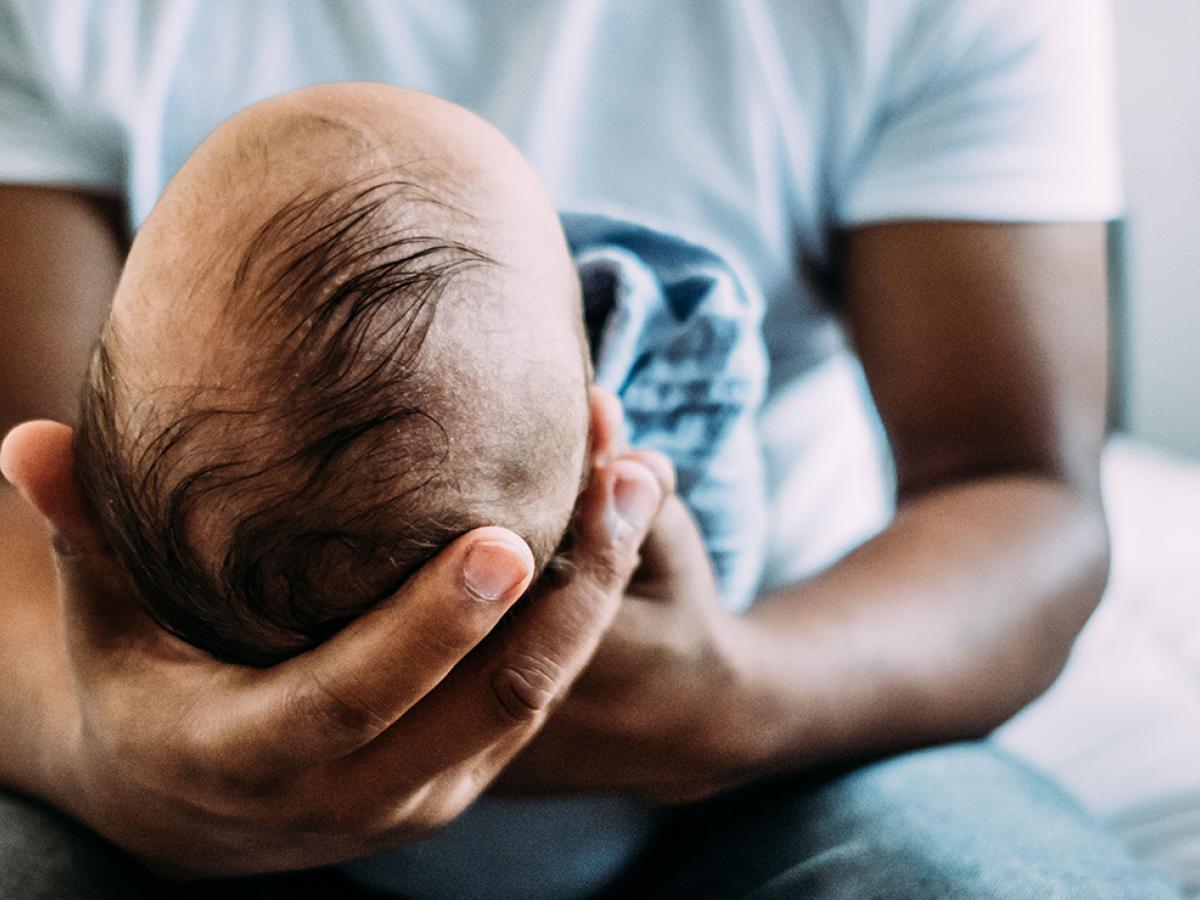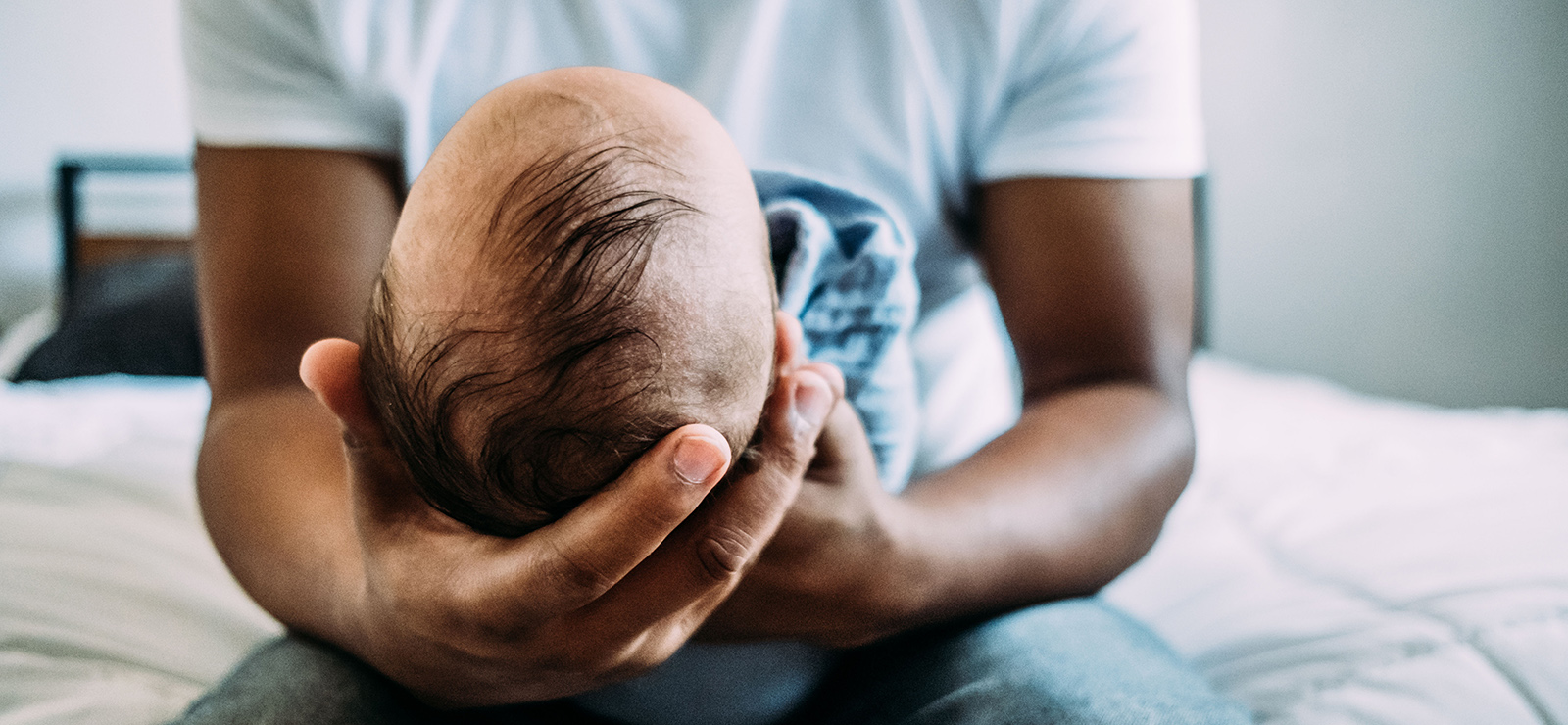November 16, 2020

Your baby is crying, and nothing seems to soothe him. You look to your partner, expecting a helping hand, but he seems checked out. Is he just being selfish, or is it something more?
We know that postpartum depression (PPD) is a serious and common risk for new moms, but we seldom think about how parenthood affects dads. Before you stew in your frustrations with your partner (believe me, I’ve been there), take a minute to consider that he might be struggling with feelings of depression.

Dr. Ella Speichinger, OB/GYN, says that men may show signs of PPD later than most women — on average, about two to six months after the baby is born — so there’s a chance your partner isn’t just being difficult.
Why do men get PPD?
Women most often get postpartum depression because of hormone changes after pregnancy. Your male partner doesn’t have the same excuse, so why would he be at risk? He didn’t exactly build a human being in his body for nine months. But I digress…
The truth is, there are a few factors to consider. For starters, spending a lot of time with a newborn actually lowers a man’s testosterone levels. This hormonal shift can affect brain chemistry, leading to a drop in serotonin — the feel-good chemical that helps regulate mood. Men who are naturally empathetic may be even more at risk, especially if they struggle to bond with their baby the way they hoped.
A history of depression also increases the chances of developing PPD. If the mother is experiencing postpartum depression, the father’s risk rises too. Watching a partner struggle can leave dads feeling helpless and overwhelmed, adding to their own emotional burden.
Life circumstances play a big role as well. Stress, lack of sleep and major life changes all put strain on mental health. If a dad felt left out during pregnancy — maybe missing ultrasounds or doctor’s visits — he might already be feeling disconnected. Once the baby arrives, things might not look or feel the way either of you expected. The isolation of new parenthood, sleepless nights and constant worry about the baby’s health can all pile up, making it harder to cope.
Some fathers also experience intrusive thoughts — unwanted, distressing thoughts that pop into their minds unexpectedly. Research suggests dads report these less often than moms and may find them less distressing, but that doesn’t mean they’re not happening. Many fathers don’t talk about intrusive thoughts because they feel ashamed or afraid of being judged. These thoughts often stem from being overwhelmed, especially when trying to meet the needs of both their baby and their partner. Dads with a history of OCD or those who experienced birth trauma are at an even higher risk. If left unchecked, these thoughts can contribute to postpartum depression or anxiety. Understanding the risk factors can help you recognize the signs early and get the right support when it’s needed.
Signs your partner could be depressed.
The signs of PPD in men are the same as those in women. Some key signs of depression are:
- Lack of attachment to child
- Lack of sleep or excessive sleep
- Irritability
- Mood swings
- Crying
- Loss of appetite
- Obsessive thoughts
- Intrusive thoughts — unwanted, persistent, and distressing thoughts that seem to come out of nowhere
- Sudden changes in weight — gaining or losing weight without much effort
- Unable to find joy in life — no longer enjoys activities he used to
- Unable to look forward to the future
- Increased sadness
- Thoughts of harm or suicide — saying their family is better off without them
What should you do?
It can seem easy to write off, especially when you’re both feeling the stress of adding a child to your family, but if your partner is consistently frustrated or acting different, it may be worth a conversation. If you’re a new mom, you’re probably familiar with the depression screening taken at each doctor’s visit — it’s called the Patient Health Questionnaire (PHQ-9) or the Edinburgh Postnatal Depression Scale (EDPS). The questions are the same for men and women, so encourage your partner to talk to their doctor and get screened as well. If left unchecked, postpartum depression can last for several years and have negative effects on your partner as well as your child.
If your partner is experiencing intrusive thoughts — unwanted, distressing thoughts that seem to come out of nowhere — it’s important to take them seriously. These thoughts often stem from anxiety or feeling overwhelmed by the responsibility of caring for both a baby and a partner who may also be struggling. Some fathers who experience birth trauma may replay the event in their minds, have nightmares, or feel haunted by decisions they had to make in the moment. Since dads process trauma differently, they may feel alone in carrying these memories. If your partner is feeling overwhelmed by these thoughts or past experiences, encourage him to reach out to a primary care provider or a therapist who specializes in perinatal mental health.
If you haven’t had your baby yet, take parenting classes together. Having a clear understanding of what to expect before your bundle of joy arrives will help set you both up for success. Encourage your partner to take leave from work once the baby arrives. It’s important for you both to have time to bond with your baby and adjust to the new family dynamic. If you suspect that your partner has postpartum depression, talk to him about it. Create an open dialogue and be supportive. Make sure that each of you get some time to do things you enjoy, split responsibilities and get as much sleep as possible. Have him schedule a therapy appointment to get an outside perspective, and if necessary, his doctor might prescribe medication.
Next Steps and Useful Resources
- Need help coping? Learn more about our mental health services.


